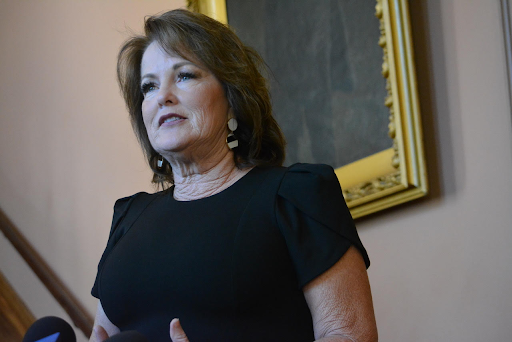
By Antonio Ray Harvey, California BlackMedia
Senate Bill (SB) 14 –legislation that makes trafficking of a minor for purposes of a commercial sex act a serious felony — is now the law in California.
Gov. Gavin Newsom signed the bill on Sept. 25 accompanied by First Partner Jennifer Siebel Newsom, State Sen. Shannon Grove (R-Bakersfield), who authored the bill, State Sen. Anna Caballero (D-Merced), as well as survivors and advocates.
SB 14 classifies human trafficking a serious felony, subjecting it to the state’s “Three Strikes” law, which imposes harsher penalties and sentencing enhancements for individuals convicted of the offense.
“Human trafficking is a sick crime. With this new law, California is going further to protect kids. I’m grateful for the leadership of Senator Grove, Speaker Robert Rivas (D-Hollister), and Pro Tem (Sen. Toni) Atkins (D-San Diego) in spearheading this bipartisan effort to make our communities and children safer,” said Gov. Gavin Newsom at the signing ceremony.
According to the US Drug Enforcement Agency, “Human trafficking involves the use of force, fraud, or coercion to obtain some type of labor or commercial sex act. Every year, millions of men, women, and children are trafficked worldwide.”
Advocates of SB 14 believe it will be a deterrent for the men and women who exploit children using the internet or force them into labor in red-light districts in major California cities such as the 5.7-mile stretch on Figueroa Boulevard in Los Angeles, Capp Street in San Francisco, International Way in Oakland, Stockton Boulevard in Sacramento, Dalbergia Street in San Diego, and Wilson Way in Stockton.
“We got some stats and numbers from Figueroa from people that work in that area to rescue women and children,” Grove said at the State Capitol on Sept. 13. “They made comments that this bill disproportionately affects people of color…and it does. (SB 14) gives women and children an opportunity to be rescued and the perpetrator to be prisoned for many years.
The United States operates a national hotline, which serves as a platform for individuals to report suspected trafficking or seek assistance. According to data gathered from the hotline in 2015 through 2021, the number of people trafficking victims nationwide rose from 12,000 in 2015 to more than 22,200 in 2019 and then fell to 16,700 in 2021.
Public Policy Institute of California (PPIC), reports that from 2015 to 2021, the share of human trafficking cases involving sex trafficking increased from 87% to 89% in California, and from 85% to 88% nationally.
Statewide and nationally, sex trafficking is most common in pornography, massage parlors, and hotels. Among those trafficked for their labor, about one in five works in private homes, according to PPIC’s data.
SB 14 was hotly debated as it made its way through the legislative process this past summer. Some members of the California Legislative Black Caucus (CLBC), including Assemblymember Reggie Jones-Sawyer (D-Los Angeles), chair of the Assembly Public Safety Committee were the targets of threats and racial slurs for not initially supporting the bill.
Jones-Sawyer and other CLBC members on the Public Safety Committee — Majority Leader Assemblymember Isaac Bryan (D-Ladera Heights) and Assemblymember Mia Bonta (D-Alameda) – argued that trafficking was already a crime under California law punishable by 15 years to life in prison. They argued that SB 14 was ineffective as a deterrent to the crime, and that it would perpetuate the poverty-to-prison pipeline.
Jones-Sawyer, who later voted to pass SB 14, said he was never against the bill, only parts of its language, which he deemed unacceptable because he felt it would cause more harm to trafficking victims rather than aid them.
A conviction under SB 14, including previous felonies, would increase prison sentences to 25 years to life. The trafficking of minors currently carries a prison term up to 12 years, or 15 years to life.
“We definitely thought there were a lot of merits to the bill, including how do we make sure these individuals are charged with serious felonies? We wanted to make sure that actually happens,” Jones-Sawyer told California Black Media. “It’s really about making sure that this doesn’t harm victims of human trafficking.”
SB 14, which passed the Assembly and Senate unanimously, is a bipartisan measure co-authored by 64 members of the Legislature. The legislation is supported by over a hundred local, national and international organizations, including a coalition of human trafficking survivors and advocates.
Since 2019, California has taken a comprehensive approach to fight human trafficking. The state has invested a total of $280.1 million to dismantle trafficking networks and support victims and survivors, according to the Newsom administration.
The state has provided substantial funding to expand support programs for human trafficking survivors and Family Justice Centers — creating a one-stop facility for victims and their families to access various services — and allocated $25 million for the prevention, intervention, and services for minor victims of commercial sexual exploitation.
Newsom has signed several laws aimed at strengthening legal safeguards for victims of trafficking, including measures for vacating convictions and for considering trauma in determining sentences.
“The trafficking of young women and girls is a heinous crime with far too many victims,” Siebel-Newsom stated. “I’ve seen the pain survivors carry for a lifetime and having recently visited the infamous Figueroa sex trafficking corridor, I’ve witnessed the devastating impacts of these crimes — not just on girls and young women — but on entire communities when trafficking persists.”


